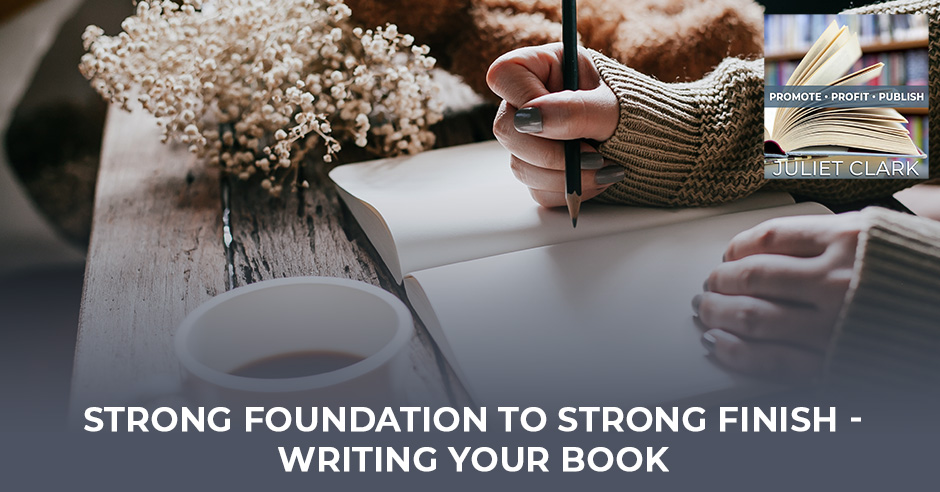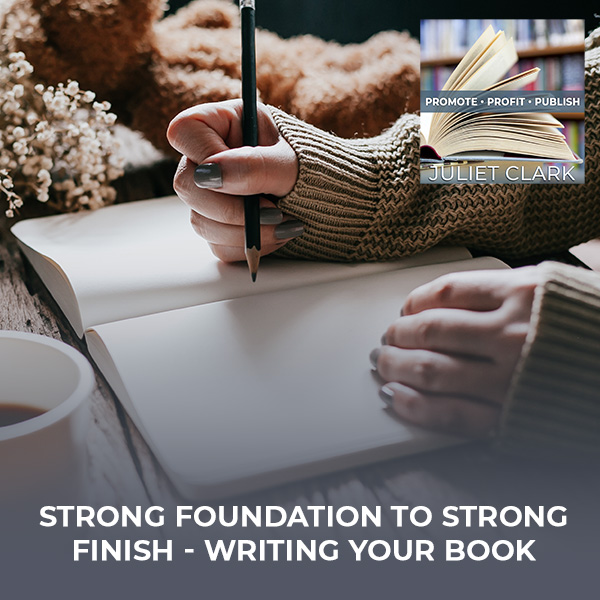
Building a strong foundation is the key to reaching a strong finish in writing your book. In this episode, join Ally Berthiaume as she dives into the essential elements of writing a book and how to go from a strong foundation to a strong finish. She explores the common misconception that sitting down in front of a computer and magically producing a book is possible. Ally explains why conceptualization, visioning, and brainstorming are crucial before even drafting a single word. She emphasizes the importance of having a clear map and outline to guide your writing journey. She discusses the need to understand your audience, define your goals, and strategically plan your book’s content. But writing is more than just putting words on a page. Ally highlights the business lens, mindset, and confidence required to succeed in the writing process. She outlines the three pillars of successful writing: strategic thinking, self-belief, and effective writing execution. Learn how these components intertwine to create a well-rounded and impactful book. Tune in so you don’t miss out on turning your book idea into a reality!
—
Watch the episode here
Listen to the podcast here
Strong Foundation To Strong Finish – Writing Your Book
In this episode, our guest is Ally Berthiaume. She is the Founder of The Wright Place Right Time, her virtual book, a boutique coaching and ghostwriting service. As a writing guide or ghost, she serves leaders, entrepreneurs and visionaries across North America and Europe who know they have the power to activate healing their own and their readers by sharing their stories and spreading their message. She supports her clients in writing the book that will light up their world and ours. She is also the author of Dear Universe, I Get It Now: Letters On The Art And Journey Of Being Brave And Being Me. Ally, how are you?
Thanks for having me back.
For those of you who’ve watched Outer Banks on Netflix, she’s Ally B that goes with John B on Outer Banks. I don’t know what his last name is either. It’s important for authors to go through courses. I know it’s simple. You guys think you can open up a Word doc and start writing but here are the structures. We found out this with a fiction novel that we got where the editor said, “You need to take my courses on how to write narrative because you wrote a whole fiction novel,” and he doesn’t have the narrative. There’s a lot more to it than just opening it up. Before we jump into that, I love in your bio that you say, “Activate healing their own and their readers. Writing a book a lot of people don’t realize is a very healing experience no matter what the topic.” Can you expand on that a little bit?
I love this phrase and this is something that I’ve been playing around with in terms of my marketing language. Inevitably my clients, whether they’re coming to me as somebody who needs a writing coach or as their ghost, no matter what exactly their role is in the process of bringing their book to full fruition and development, they realize that in either sharing their personal stories, message or expertise, they uncover things about themselves or heal parts of their past or even the more recent past, that they didn’t realize or expect.
For those people working on memoirs, which is one of my passion areas, they’re rewriting their narrative. They’re looking backward in time. They’re looking at something that was problematic, traumatic, adverse and challenging. They’re looking at it through the lens of who they are currently and how far they’ve come. They have a new appreciation for what they’ve been through because they recognize how much that experience has shaped them, in positive ways, even if it was a negative experience.
There’s a different healing energy or an integration that happens when we are the author of the story. We’re finding new agency over what we’ve been through. Rather than being thick of it like the victim survivor, we’re on the other side of it, creating meaning out of what we’ve been through and then impact from that meaning. In that way, we’re activating our internal, healing process. When our reader gets the chance to spend some time with it, they’re going to see some part of themselves in that story and their healing might be activated.
Even if you’re writing nonfiction, business books, prescriptive, whatever it is, I find that the people I work with, they’ve come to their work because of something that has happened like a personal story, memory or experience that has impacted them in a critical way. They bring those parts of themselves to their businesses and therefore to the way that they approach their business or content.
They think, “I’m writing a book about my expertise.” It ends up being much more than that. They recognize maybe that they are an expert and maybe some Imposter syndrome is healed or they recognize the path that they’ve taken as an entrepreneur and they’re like, “I am badass. I didn’t even consider that before.” Books are almost like different types of mirrors for ourselves and the paths that we’ve been on. That’s how we get to that healing piece.
Books are almost like different types of mirrors for ourselves and the paths that we've been on, and that's really how we get to that healing piece. Share on XI have a book coming out that surrounds this called The Author Alchemy. It is 90 days of gratitude and putting your goals down manifestation. During all of my writing journeys, I would come across these healing obstacles. I found that I wasn’t grateful, which was part of my problem. Take that gratefulness and then learn how to manifest from it as well because you get down on yourself.
All of a sudden, this thing comes up from your childhood. You can’t write or figure out what’s going on. You bling your eyes out and you don’t know why. It happens with a lot of people when they write a book because it is holding that mirror up and figuring out what’s going on. Thank you for sharing that. Look for Author Alchemy. I’ll be saying more about it but it’s funny as you said that, I was like, “I sent that off to the formatter.”
You believe very strongly in strong foundations and strong finish. I want to talk about some of your courses because many authors try to write a book. They think they know how. They don’t really know how but then there’s the other part where they might hire a writing coach. Not everybody hires a writing coach. Talk a little bit about the courses and why those foundations need to be strong within a book.
You said something and it blew my mind because I wrote a social media post about this. It hasn’t gone out yet but I was drafting it. That’s the myth, “I have the idea or the will to write a book. If I go and sit down in front of my computer, it will be solved.” That is some wizarding power if you can sit down at your computer and stare at the screen as if you’ve got Superman’s vision and it’s going to burn words onto the blank page and the book is going to reveal itself.
To me, writing starts with conceptualization, visioning and brainstorming before anything else. I don’t think a lot of the time we are going to have a winning strategy when we sit down and decide to type whatever comes to mind. To me, that’s like getting into a car with no plan on where you’re heading and expecting the car is going to drive itself and keep you safe. Thankfully, we’re not there yet with cars.
I feel like with the book, you need a map or an outline. You need to understand where you’re going, who you’re trying to talk to, what you’re trying to do and what you want that piece to do for you. There are many things that need to be established before we draft a word of the final thing that we’re hoping to achieve. This idea, “I’m dedicated. I’m motivated. I’ll sit down, start writing and all will be well,” to me is very unrealistic. When you don’t have a sense of where you want to end up, you don’t know how to get there. It looks like starting and stopping. It looks like frustration. It could look like procrastination or giving up altogether like, “I’m not up for this. I’m not meant for this.”
It has nothing to do with your capability, skill or motivation. It has to do with the fact that you have a half-cooked idea or you don’t know what you don’t know about writing and publishing or its mindset and confidence. This is the second piece to this strong foundation and strong finish, which is that writing is not just writing. There’s a business lens, mindset piece and actual writing. There are three main pillars to writing being successful, knowing how to think strategically, which is your business hat, believing that you can do it, which is your mindset and confidence and then the actual writing itself, figuring out what you’re going to say, how you’re going to say it and doing that well.
That’s where these two programs that I run step into fulfill those needs. On one hand, there’s something that’s a little bit broader for your novice, newbie writer or aspiring author that I call the writing bar. It’s a chance for people to show up in the community three times a month. We get together for one hour at a time. We do 15 minutes of writing instruction at the top of the hour, 30 minutes of uncensored writing time and 15 minutes of Q&A or coaching on the other side of the hour. It’s a beautiful little container to jumpstart the engine.
The other thing when you start talking about that start-stop is I talked to many authors who will tell me, “I’m writing a book. I’ve been writing it for the last five years.” I’ll say, “How far along are you?” I’ll hear, “I’ve been rewriting chapter one.” Nobody ever published a rewritten chapter one. You have to put that structure together you’re talking about. I call it the vomit draft. You have to get into the vomit draft and then start rewriting from there.
If you can’t even do the vomit draft and you don’t have those basics, that roadmap in place, it’s essential to do that. With the writing bar, that’s you going along, writing with them and keeping that momentum going to get to the end and then start going back, rewriting, reworking and maybe adding those ideas that you didn’t put down in that initial map.
There are some people who are working more on smaller pieces because they’re building up their writing muscles and confidence. They might not be working each time we get together on the same piece as much as trying to write something that’s succinct and they’re going to use it for their business marketing. They’re working on a blog post or something.
Eventually, what we’re trying to do is you’re going to apply those same writing skills and principles to something longer because you’ve built the confidence, skill and understanding of these smaller pieces. There are people in there that are the book is still very far off in the future because they’re trying to get where they think they need to be here. There are others who are actively working on the book and are using that time to work on those first drafts.
What’s beautiful about that 30-minute writing block in the middle is I call it uncensored because the goal here is to not nitpick what you are saying or doing. It is purposely to be in the mess of the first draft, to not be doctoring a line for a whole 30 minutes because you’re trying to get the word choice down or make sure that what you’re saying is precise or perfect.
I like to say and this goes back to the start problem, what’s the point in reviewing one line, paragraph or page umpteen thousand times when after you get 100 pages, you’re going to inevitably revise it to a point where that first page is no longer going to be there at all? You might cut it entirely or it needs to be reconstructed because one of those paragraphs belongs in chapter three. You’ve spent all this time trying to fix a page that will look entirely different when you’re reading it in the holistic placement of the whole draft. Quit getting in your way. You can’t make something perfect when you don’t have something whole.
Quit getting in your own way. You can't make something perfect when you don't have something that is whole. Share on XI’ve had those days. I suck at writing. I’m a good storyteller. I am heavily edited when it gets over to the editor. There’s a deep copy edit going on there. What I do get a chuckle out of is when I’ve had a good writing day and then I go back on rewrites. I’ve used the wrong tense of words and words that are pair-pear. I’m writing about a pair of people and it’s pear. I’m like, “What am I thinking? I know the difference.” If I didn’t have that to work from, 1) I couldn’t get a good laugh at myself. 2) I don’t stop and micromanage those words at that time. That’s what you’re doing. You’re never going to get that book if you’re micromanaging every word in real time on the first draft.
The other thing people think is, “I need to start at the beginning because in writing there’s an intro, middle and conclusion.” This is what we know of the basic anatomy of a written piece from our education in high school. The thing is just because eventually what the reader sees is a beginning and middle and an end and they’re very organized, that doesn’t mean that’s how you have to enter into the writing. You can start writing with what you know and then rearrange it later.
The draft is about making meaning and figuring out what you’re trying to say. You can always then get it in the right place and right order later but you can’t move those pieces around if those pieces don’t exist. The writing bar is exploring that messy first draft. It’s getting in there. It’s letting go of perfectionism. It’s about process and improvement. It’s about learning what your natural writing strengths are and where your areas of improvement are to sharpen.

Writing A Book: The writing bar explores that messy first draft. It’s getting in there, it’s letting go of perfectionism, it’s about the process, it’s about improvement.
That’s why on either side of that half an hour, I do the education and coaching. We’re learning and growing but we’re not letting it hold us back from that 30 minutes of concerted writing time where we’re in the writing. We’re not trying to use the thesaurus for word choice or worry about what Grammarly’s saying about that comma. Let’s write down the things that we are called to say. We’ll figure out how to make them sound better later.
I’m impressed that you used Grammarly. I canceled it because it interfered with some other programs that I was working with, especially email. I don’t know what it was doing. That might be a reason that my books are challenging to edit as well because my Grammarly is gone.
It’s not always perfect, that’s one thing.
That’s a good point. If you look at a Word document when you go in and use spell check, we find when you format books, when people have done that and they haven’t used a real editor, there are words that are acceptable but they don’t make sense. The word spell check doesn’t pick up. Tell me about the blank page of your book’s blueprint. I feel like that’s another masterclass that a lot of people could use before they sit down and even start writing.
This is a little bit different and it’s more of a do-it-yourself approach. I use the platform Thinkific. It’s a course portal. All of the videos, modules, lessons and homework are all there to do at your pace. The point of that program is to get people to write an entire blueprint for themselves before they draft a single word. It’s those things that I mentioned in the beginning under a strong foundation and strong finish.
Understanding, why are you doing this? Who are you writing it for? What is the main point of your story? Understand your story arc, table of contents and chapter abstracts. Those are all pieces to me of having a strong foundation before you sit at the blank page and try to type anything. It’s making sure that the arc is there when you’re writing something that’s narrative nonfiction, which the course is focused on, predominantly for memoir.

Writing A Book: Understanding your story arc, your table of contents, and your chapter abstracts are all pieces of having a strong foundation before you actually sit at the blank page and try to type anything.
Although a lot of the moves that we would make in a narrative arc can also be translated into a business book. There are still three acts. You’re still taking people on a journey. There’s still an introduction, a meaty middle and a conclusion. There are a lot of very similar moves and transferable skills but this particular course is helping people identify their memoirs. Not in a way that people think of memoir, which is to regurgitate every life event but to think carefully about the point of some of their most critical life experiences. What is the meaning of those? What do they want to share with the reader? Do it in a compelling way that reads like a novel, is written strongly and isn’t just this flat, “Look at me,” autobiographical thing, which a memoir is not.
Part of this course is teaching the genre, what makes it distinct from autobiography or biography, helping people understand the difference between circumstance, life events and what the story of a book is, which is the emotional piece that a reader gets behind and then organizing their thoughts and story in a way that’s going to translate into that beautiful book through chapters, scene development and all of those things. It’s that strong foundation piece. It’s setting up this document that’s going to serve as your guide and map before you sit down to write that opening chapter, the opening scene and the line that hooks them in.
I read for the first time in a very long time when I was on vacation, a Stone Barrington book. I’m sometimes surprised by the lack of writing skills of some top writers that are making a lot of money. It’s like, “How do we get from here to here?” Strive to write better and don’t use some of those people as models because some of those people that are out there writing are not strong writers. I noticed that a lot of you have read a Stone Barrington book.
Other people are like, “If they can do it, I can do it too.”
It’s a mystery novel and it’s like, “Wait, what?” He has years of books. That’s the character in it. That’s not the author. I don’t remember the author’s name. Every time I listen, I’m like, “How did this person ever get a real publishing contract?”
I guess they figured out a formula and a reader niche, a reader that isn’t reading with the same critical or editorial eye that somebody else is looking for a higher art form. They’ve nailed the reader who’s good with whatever their style is and their ability to deliver a particular story. I feel like I’m a snob. I’m going to weigh things very differently. Part of that has to do with I’ve been studying books and writing my entire life. I have a Master’s of Fine Arts and Creative Writing. I feel like my standard is higher. There are certain books that I’m like, “I’m not going to let them get away with that. Bad review.”
Whereas other people are like, “I loved it. It was great.” I’m like, “It would’ve been the equivalent of me watching reality TV.” Some people love that and I can’t stand it. This is where that writing is subjective and that’s why we have a range of books out there that are on that continuum of poor to excellent. The author’s job is to know as much as you can, be as best as you can and put your best forward. Don’t just sit down, willy-nilly around and wing it. At least be able to say that you did your due diligence. You studied, read, tried, wrote a draft and revised a draft.
The author's job is to know as much as you can be as best as you can, put your best forward. Share on XThe Stone Barrington books are more male-focused because where I roll my eyes every time is, “You met her this morning and she’s sleeping with you already?” I think it is a guy thing. It seriously doesn’t happen like, “In this book, everybody’s trying to kill you again and everybody who’s not trying to kill you is sleeping with you?”
There are only those two paths.
That’s why I said it must be a male-oriented book. It must be written for men. Sorry, if I have men readers. You are as shallow as you appear. If we want to take part in your writing bar, where do we show up and sign up? I would think this would be a great program if you were struggling to find time to write every week, to know that this is the time you’re going to show up, this is the structure and how it’s going to be. I would say this is probably for those people as well who struggle to find the time to write.
Time and accountability are two huge pieces of this program. We’re meeting three times a month so that’s almost a touch base once a week. What do you think about it? It’s surprising how many words you can get written in that 30-minute time spot when you’re devoted to that only. You’re not being distracted. You’re with other people who are doing the same thing and you’re not trying to edit the crap out of your words the first time. You’re just trying to get them down. Both having that time built into your monthly schedule and then also being with other people is a beautiful structure for folks who have a hard time getting their butt into the writing chair.

Writing A Book: It’s really surprising how many words you can get written in that 30-minute time spot when you’re devoted to that.
The other great thing about this is that I give a free trial. If people are interested in the program and want to come to check it out for 1 hour, they can come for 1 hour for free and be there with us, see the vibe and energy, do a little writing, see how we roll and then make a decision after if they want to commit to coming into the program. The link that you’re going to include, that’s where they get the information. They could automatically enroll if they want. If they want that free trial, then they have to reach out to me either on my connection form on my website or they can email me and say, “I want to come to a free trial session at the writing bar,” and I’ll be in touch. We’ll get them on the calendar.
Being accessible to a group of writers can be helpful, I had a gentleman on my show who I was talking to. He does character development. It was amazing when I told him the story and how he came up with a different spin for one of my characters. I’m the most non-romantic person ever. I don’t know why but he’s like, “What if he loved her much that he thought he’d lose her if he told her?” I was like, “I never thought about that.” You’ll be amazed at the spin when you’re in a place with other writers who can give you some feedback as well.
Not just that but also that other people have the same blocks and barriers that you do. Other people are starting and stopping, procrastinating or letting the fifteen other tabs on their computer distract them and give them squirrel brains. Being in that community allows you to recognize, “My writing challenge or the thing that always trips me up is not unique.” Other people are experiencing it as well and then people can say, “I’ve tried this or that.” I don’t have to be the only expert voice here.
These are other real people and writers who are struggling. You have that ability to communicate with them, not just in those sessions but we also have a community through Thinkific where you can access each other in between sessions. You can access the recordings and the replays. People coming in would get access to everything that’s happened when I brought the portal up and set that up. There’s a lot of material value and wealth within this program for the person who’s trying to get their hands around writing in a book.
Go over to TheWritePlaceRightTime.com and you’ll find The Writing Bar and her DIY masterclass, From Blank Page to Your Book’s Blueprint. If we want to reach out to you for other things, how do we get ahold of you?
I’m constantly on LinkedIn. They can connect with me there but also email Ally@Twprt.com. I’ll be checking.
Thank you so much for being on.
Thanks for having me back.
Important Links
- The Wright Place Right Time
- Dear Universe, I Get It Now: Letters On The Art And Journey Of Being Brave And Being Me
- Thinkific
- The Writing Bar
- From Blank Page to Your Book’s Blueprint
- LinkedIn – Alyssa Berthiaume
- Ally@Twprt.com
- https://TheWritePlaceRightTime.com/index.php/Learn/
About Ally Berthiaume
 Alyssa Berthiaume is the founder of The Write Place, Right Time, her virtual boutique of book coaching and ghostwriting services. As a writing guide or ghost, Berthiaume serves leaders, entrepreneurs, and visionaries across North America and Europe who know they have the power to activate healing (their own and their readers’) by sharing their stories and spreading their message. She supports her clients in writing the book that will light up their world and ours. Berthiaume is also the author of Dear Universe, I Get it Now: Letters on the Art and Journey of Being Brave and Being Me.
Alyssa Berthiaume is the founder of The Write Place, Right Time, her virtual boutique of book coaching and ghostwriting services. As a writing guide or ghost, Berthiaume serves leaders, entrepreneurs, and visionaries across North America and Europe who know they have the power to activate healing (their own and their readers’) by sharing their stories and spreading their message. She supports her clients in writing the book that will light up their world and ours. Berthiaume is also the author of Dear Universe, I Get it Now: Letters on the Art and Journey of Being Brave and Being Me.
Love the show? Subscribe, rate, review, and share!









Leave A Comment